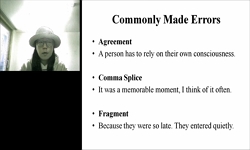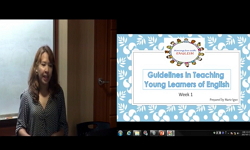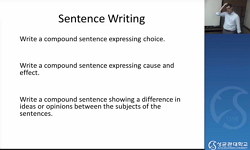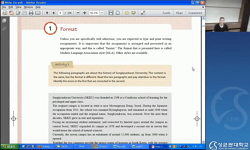The purpose of the present study is to investigate the effects of teacher feedback training on the type of the written feedback Korean EFL teachers give on student writing. A feedback training program was designed for in-service and pre-service Korean...
http://chineseinput.net/에서 pinyin(병음)방식으로 중국어를 변환할 수 있습니다.
변환된 중국어를 복사하여 사용하시면 됩니다.
- 中文 을 입력하시려면 zhongwen을 입력하시고 space를누르시면됩니다.
- 北京 을 입력하시려면 beijing을 입력하시고 space를 누르시면 됩니다.
부가정보
다국어 초록 (Multilingual Abstract)
The purpose of the present study is to investigate the effects of teacher feedback training on the type of the written feedback Korean EFL teachers give on student writing. A feedback training program was designed for in-service and pre-service Korean EFL teachers based on the training sequence of "Approach,Response, and Follow-up" suggested in Ferris and Hedgcock (2005)and Ferris (2007). The study analyzed the strategies employed in providing error correction and the types of teacher commentary given before and after training by 20 Korean secondary EFL teachers. The study also investigated the effects of training on the teachers' self-efficacy in providing written feedback on student writing. The results indicate that before the training Korean EFL teachers viewed their role mainly as providing error correction. The changes in post-training feedback suggest that the training program helped teachers become more aware of the different roles of teacher feedback. Additionally, an increase in teachers' confidence in providing feedback was found post-training.
참고문헌 (Reference)
1 Lee,I, "Understanding teachers’ written feedback practices in Hong Kong secondary classrooms" 17 : 69-85, 2008
2 Ferris,D.R, "The influence of teacher commentary on student revision" 31 : 315-339, 1997
3 Chandler,J, "The efficacy of various kinds of error feedback for improvement in the accuracy and fluency of L2 students writing" 12 : 267-296, 2003
4 Truscott,J, "The case against grammar correction in L2 writing classes" 46 : 327-369, 1996
5 류영숙, "The Effects of Indirect and Direct Error Feedback on Korean College Students’ Accuracy Improvement in Writing" 한국외국어교육학회 13 (13): 241-262, 2006
6 Lee,I, "Ten mismatches between teachers’ beliefs and written feedback practice" 63 : 13-22, 2009
7 Ferris, D. R., "Teaching ESL composition: Purpose, process, and practice (2nd ed.)" Lawrence Erlbaum 2005
8 Montgomery, J. L., "Teacher-written feedback: Student perceptions, teacher self-assessment, and actual teacher performance" 16 : 82-99, 2007
9 Goldstein,L.M, "Teacher written commentary in second language writing classrooms" The University of Michigan Press 2005
10 Fathman, A., "Teacher response to student writing: Focus on the form versus content. In Second language writing: Research insight for the classroom" Cambridge University Press 178-190, 1990
1 Lee,I, "Understanding teachers’ written feedback practices in Hong Kong secondary classrooms" 17 : 69-85, 2008
2 Ferris,D.R, "The influence of teacher commentary on student revision" 31 : 315-339, 1997
3 Chandler,J, "The efficacy of various kinds of error feedback for improvement in the accuracy and fluency of L2 students writing" 12 : 267-296, 2003
4 Truscott,J, "The case against grammar correction in L2 writing classes" 46 : 327-369, 1996
5 류영숙, "The Effects of Indirect and Direct Error Feedback on Korean College Students’ Accuracy Improvement in Writing" 한국외국어교육학회 13 (13): 241-262, 2006
6 Lee,I, "Ten mismatches between teachers’ beliefs and written feedback practice" 63 : 13-22, 2009
7 Ferris, D. R., "Teaching ESL composition: Purpose, process, and practice (2nd ed.)" Lawrence Erlbaum 2005
8 Montgomery, J. L., "Teacher-written feedback: Student perceptions, teacher self-assessment, and actual teacher performance" 16 : 82-99, 2007
9 Goldstein,L.M, "Teacher written commentary in second language writing classrooms" The University of Michigan Press 2005
10 Fathman, A., "Teacher response to student writing: Focus on the form versus content. In Second language writing: Research insight for the classroom" Cambridge University Press 178-190, 1990
11 Ferris, D. R., "Teacher commentary on student writing: Description and implications" 6 : 155-182, 1997
12 Hyland, F., "Sugaring the pill: Praise and criticism in written feedback" 10 : 185-212, 2001
13 Mi-KyungKim, "Self-efficacy of Korean EFL Writing Instructors and Its Relationship with Their Feedback to Students" 한국영어교육학회 58 (58): 81-111, 2003
14 Hyland,K, "Second language writing" Cambridge University Press 2003
15 Robb, T., "Salience of feedback on error and its effect on EFL writing quality" 20 : 83-93, 1986
16 Ferris,D.R, "Response to student writing: Implications for second language students" Lawrence Erlbaum 2003
17 Zamel,V, "Responding to student writing" 19 : 79-101, 1985
18 Lalande,J.F, "Reducing composition errors: An experiment" 66 : 140-149, 1982
19 Goldstein,L.M, "Questions and answers about teacher written commentary and student revision: Teachers and students working together" 13 : 63-80, 2004
20 Ferris,D.R, "Preparing teachers to respond to student writing" 16 : 165-193, 2007
21 Ashwell,T, "Patterns of teacher response to student writing in a multi-draft composition classroom: Is content feedback by form feedback the best method" 9 : 227-258, 2000
22 Hyland, F., "Interpersonal aspects of response: Constructing and interpreting teacher written feedback. In Feedback in second language writing" Cambridge University Press 206-224, 2006
23 Harmer,J, "How to teach writing" Pearson Longman 2004
24 Lee,I, "Feedback revolution: what gets in the way" 65 : 1-12, 2011
25 Bitchener,J, "Evidence in support of written corrective feedback" 17 : 102-118, 2008
26 Ferris,D.R, "Does error feedback help student writers? New evidence on the short- and long-term effects of written error correction. In Feedback in second language writing" Cambridge University Press 81-104, 2006
27 Leki,I, "Coaching from the margins: Issues in written response. In Second language writing: Research insight for the classroom" Cambridge University Press 57-68, 1990
동일학술지(권/호) 다른 논문
-
Tough류 형용사와 Essential류 형용사의 보문구조에 관한 최소주의적 연구
- 한국영어학회
- 강선옥
- 2011
- KCI등재,SCOPUS
-
Temporal Resolution in English Read Speech by Native speakers and Korean learners
- 한국영어학회
- Hansook Choi
- 2011
- KCI등재,SCOPUS
-
Needs analysis for effective English village curriculum in Korea
- 한국영어학회
- Hee-Joo Im
- 2011
- KCI등재,SCOPUS
-
Investigating the Rationality of Using Composite Scores for a Speaking Placement Assessment
- 한국영어학회
- Hyun Jung Kim
- 2011
- KCI등재,SCOPUS
분석정보
인용정보 인용지수 설명보기
학술지 이력
| 연월일 | 이력구분 | 이력상세 | 등재구분 |
|---|---|---|---|
| 2024 | 평가예정 | 계속평가 신청대상 (등재유지) | |
| 2019-01-01 | 평가 | 우수등재학술지 선정 (계속평가) | |
| 2016-01-01 | 평가 | 등재학술지 유지 (계속평가) |  |
| 2014-09-29 | 학회명변경 | 영문명 : 미등록 -> The Korean Association for the Study of English Language and Linguistics |  |
| 2013-01-01 | 평가 | 등재학술지 유지 (등재유지) |  |
| 2010-01-01 | 평가 | 등재학술지 유지 (등재유지) |  |
| 2007-01-01 | 평가 | 등재학술지 선정 (등재후보2차) |  |
| 2006-01-01 | 평가 | 등재후보 1차 PASS (등재후보1차) |  |
| 2005-10-16 | 학술지명변경 | 한글명 : 영어학(Korean Journal of English Language and Linguistics) -> 영어학 |  |
| 2004-01-01 | 평가 | 등재후보학술지 선정 (신규평가) |  |
학술지 인용정보
| 기준연도 | WOS-KCI 통합IF(2년) | KCIF(2년) | KCIF(3년) |
|---|---|---|---|
| 2016 | 0.65 | 0.65 | 0.55 |
| KCIF(4년) | KCIF(5년) | 중심성지수(3년) | 즉시성지수 |
| 0.53 | 0.5 | 1.12 | 0.08 |





 KCI
KCI






